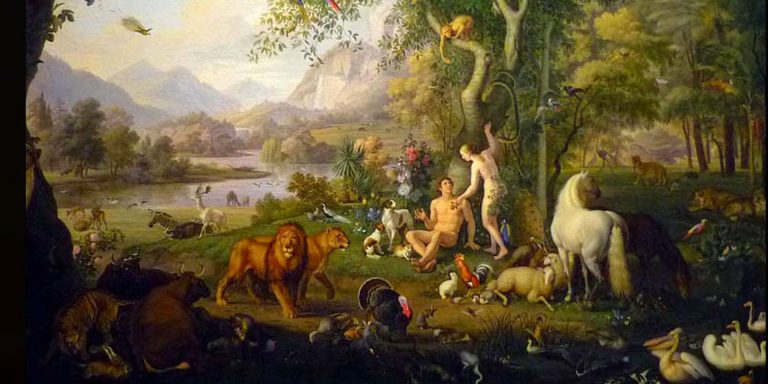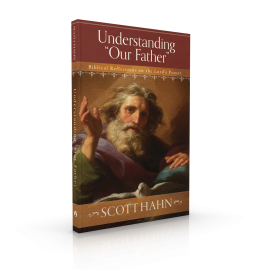By Scott Hahn
Scott Hahn, Founder and President of the St. Paul Center, is author of over forty books. Understanding "Our Father": Biblical Reflections on the Lord's Prayer is one of his most popular works, going step by step through the powerful prayer we often take for granted.

The Lord’s Prayer is like a marathon course whose last mile winds up a steep hill. Or it’s like a Himalayan mountain whose ultimate peak crowns a sheer, vertical rock face.
We approach the end of the Our Father, and still we face the petition that has proven a stumbling block to many great minds in Christian history. The psychoanalyst C. G. Jung’s misinterpretation of this petition was a major factor in his break with orthodox Christianity. He cited Jesus’ words as evidence that God is not merely “love and goodness,” but also “the tempter and destroyer.”
Why, after all, would God lead us into temptation? When the Scriptures speak of a “tempter,” they always mean the Devil (Matt 4:3; 1 Thess 3:5). Temptation is the hallmark of Satan’s action in our lives. Why, then, are we praying that God—“Our Father . . . in heaven”—will not lead us into temptation?
We must read Jesus’ words with utmost care, for He chose them with a precision that is perfect and all-knowing.
The Lord’s Prayer is not the only time Jesus directed His followers to pray against temptation. Twice in the Garden of Gethsemane, He urged the apostles, “Pray that you may not enter into temptation. . . . Rise and pray that you may not enter into temptation” (Luke 22:40, 46).
We may conclude, then, that temptations are something to be strenuously avoided. However, Jesus also said that temptations are inevitable: “For it is necessary that temptations come, but woe to the man by whom the temptation comes!” (Matt 18:7). It is clear, in this last context, that God is not the originator of temptations. God does not tempt us. “Let no one say when he is tempted, ‘I am tempted by God’; for God cannot be tempted with evil and he himself tempts no one” (Jas 1:13). But temptations do come—from our fellowmen, as Jesus implies above; from the Devil, as we see in Jesus’ encounter with Satan in the desert (Matt 4:1-11); and from adverse circumstances in life, such as physical illness, failure, or humiliation.
God does not will our pain; nor does He will the sins of others, which cause us pain. Suffering and death came into the world as a result of the sin of Adam and Eve. Yet God’s will is accomplished in spite of these things; and He has ordained every occasion of temptation to be an occasion of grace as well. It all turns on how we respond.
This is a subtle matter, but a very important one, and it is easy to see how it has scandalized even great minds such as Jung’s—for it involves the cooperation of God’s omnipotent will and our human freedom.
God did not force Adam and Eve to love or obey Him. He allowed them a choice. He placed them in a garden full of delights and invited them to partake of any tree but one. “[O]f the tree of the knowledge of good and evil you shall not eat,” God commanded, “for in the day that you eat of it you shall die” (Gen 2:17).
Temptation came to the primal couple in the form of a serpent—a deadly beast with an angelic intelligence. He posed veiled threats as, with crafty words, he undermined Adam and Eve’s trust in God. Fearing for their lives, and too proud to cry out for help, they consented to the temptation. They sinned, and in sinning they failed the test that God had permitted for their good. If they had feared God more than they feared the serpent, they would have chosen martyrdom at that moment, and they would have entered into a life even greater than paradise. By offering a complete sacrifice of their lives, they would have begun to live the life of glory. For God is love, and love demands a total gift of self. In eternity, the complete gift of self is the Trinity’s inner life. In time, the image of divine life is sacrificial, life-giving love. We must die to ourselves for the sake of another. And that’s what Adam and Eve failed to do.
Why would God allow this? The Catechism quotes the ancient scholar Origen in this regard: “God does not want to impose the good, but wants free beings” (CCC 2847). God made man and woman to be free. That free choice is what made temptation possible. But it is also what made love possible. For love cannot be coerced; love requires a free movement of the will. With freedom came the potential for the highest love, but also for the gravest peril.
You Might Also Like

The prayer at hand has been called many things: the Pater Noster, the Our Father, the Model Prayer, the Lord’s Prayer. In Understanding “Our Father”: Biblical Reflections on the Lord’s Prayer, Scott Hahn presents a unique meditation on this common prayer, leading readers to consider the wealth of meaning in its seeming simplicity.